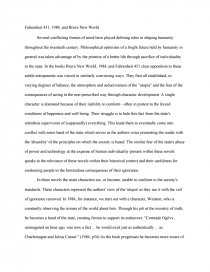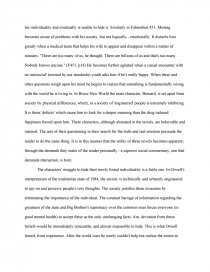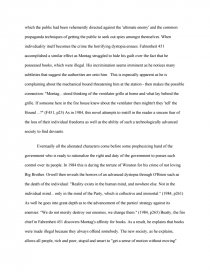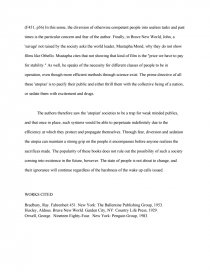Fahrenheit 451, 1984, and Brave New World
Essay by review • November 22, 2010 • Essay • 1,348 Words (6 Pages) • 2,467 Views
Fahrenheit 451, 1984, and Brave New World
Several conflicting frames of mind have played defining roles in shaping humanity throughout the twentieth century. Philosophical optimism of a bright future held by humanity in general was taken advantage of by the promise of a better life through sacrifice of individuality to the state. In the books Brave New World, 1984, and Fahrenheit 451 clear opposition to these subtle entrapments was voiced in similarly convincing ways. They first all established, to varying degrees of balance, the atmosphere and seductiveness of the "utopia" and the fear of the consequences of acting in the non-prescribed way through character development. A single character is alienated because of their inability to conform - often in protest to the forced conditions of happiness and well being. Their struggle is to hide this fact from the state's relentless supervision of (supposedly) everything. This leads them to eventually come into conflict with some hand of the state which serves as the authors voice presenting the reader with the 'absurdity' of the principles on which the society is based. The similar fear of the state's abuse of power and technology at the expense of human individuality present within these novels speaks to the relevance of these novels within their historical context and their usefulness for awakening people to the horrendous consequences of their ignorance.
In these novels the main characters are, or become, unable to conform to the society's standards. These characters represent the authors' view of the 'utopia' as they see it with the veil of ignorance removed. In 1984, for instance, we start out with a character, Winston, who is constantly observing the ironies of the world about him. Through his job at the ministry of truth, he becomes a hand of the state, creating fiction to support its endeavors: "Comrade Ogilvy, unimagined an hour ago, was now a fact ... he would exist just as authentically ... as Charlemagne and Julius Caesar." (1984, p54) As the book progresses he becomes more aware of his individuality and eventually is unable to hide it. Similarly in Fahrenheit 451, Montag becomes aware of problems with his society, but not logically - emotionally. It disturbs him greatly when a medical team that helps his wife to appear and disappear within a matter of minutes: "There are too many of us, he thought. There are billions of us and that's too many. Nobody knows anyone." (F451, p14) He becomes further agitated when a casual encounter with an 'antisocial' (normal by our standards) youth asks him if he's really happy. When these and other questions weigh upon his mind he begins to realize that something is fundamentally wrong with the world he is living in. In Brave New World the main character, Bernard, is set apart from society by physical differences, which, in a society of 'engineered' people is extremely inhibiting. It is these 'defects' which cause him to look for a deeper meaning than the drug induced happiness forced upon him. These characters, although alienated in the novels, are believable and rational. The acts of their questioning in their search for the truth and real emotion persuade the reader to do the same thing. It is in this manner that the utility of these novels becomes apparent; through the demands they make of the reader personally - a superior social commentary, one that demands interaction, is born.
The characters' struggle to hide their newly found individuality is a futile one. In Orwell's interpretation of the totalitarian state of 1984, the society is technically and urbanely engineered to spy on and perceive people's very thoughts. The society justifies these invasions by eliminating the importance of the individual. The constant barrage of information regarding the greatness of the state and Big Brother's supremacy over the common man forces everyone (in good mental health) to accept these as the only unchanging facts. Any deviation from these beliefs would be immediately noticeable, and almost impossible to hide. This is what Orwell feared, from experience. After the world wars he surely couldn't help but realize the extent to which the public had been vehemently directed against the 'ultimate enemy' and the common propaganda techniques of getting the public to seek out spies amongst themselves. When individuality itself becomes the crime the horrifying dystopia ensues. Fahrenheit 451 accomplished a similar effect as Montag struggled to hide his guilt over the fact that he possessed books, which were illegal. His incrimination seems imminent as he notices many subtleties that suggest the authorities are onto him. This is especially apparent as he is complaining about the mechanical hound threatening him at the station - then makes the possible connection: "Montag ...stood thinking of the ventilator grille
...
...



